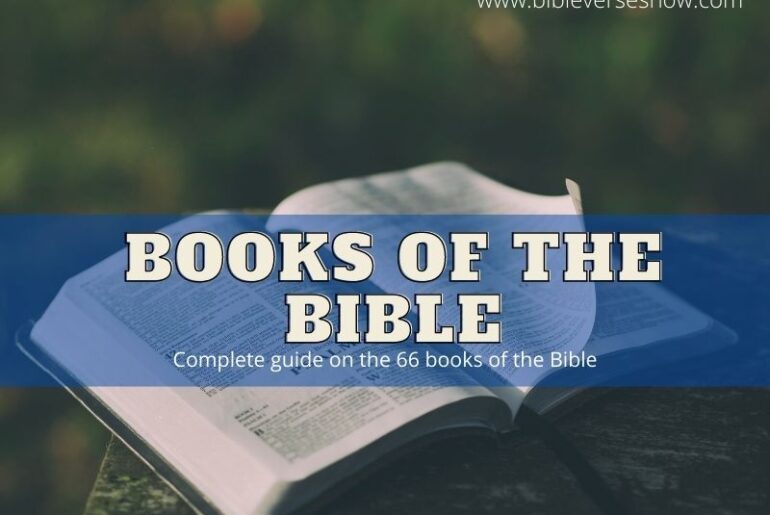Books of the Bible were written under the supernatural guidance of the Holy Spirit by laymen and scholars, commoners, and nobility; the Bible is as unique as it is profound, containing 66 ancient books that have shaped laws, influenced culture, and inspired billions to faith over three millennia.
Divided into two parts, the Old Testament and the New Testament, the Bible is a critical historical and moral study for all that is as relevant today as it ever was.
|
Contents Old Testament Books |
| Genesis Exodus Leviticus Numbers Deuteronomy Joshua Judges Ruth 1 Samuel 2 Samuel 1 Kings 2 Kings 1 Chronicles 2 Chronicles Ezra Nehemiah Esther Job Psalms Proverbs Ecclesiastes Song of Solomon Isaiah Jeremiah Lamentations Ezekiel Daniel Hosea Joel Amos Obadiah Jonah Micah Nahum Habakkuk Zephaniah Haggai Zechariah Malachi |
New Testament Books |
| Matthew Mark Luke John Acts Romans 1 Corinthians 2 Corinthians Galatians Ephesians Philippians Colossians 1 Thessalonians 2 Thessalonians 1 Timothy 2 Timothy Titus Philemon Hebrews James 1 Peter 2 Peter 1 John 2 John 3 John Jude Revelation |
Old Testament
A collection of divinely inspired books written between 1450 B.C. and 430 B.C., the Old Testament is a historical record of God’s people, laws, and sayings. It promises that it function as a moral living and conduct model.
2. Exodus
Author: Moses
|
| God appointed Moses to lead the Israelites out of slavery in Egypt to the Promised Land of Canaan, establishing a special relationship with them on the way to Mount Sinai. |
3. Leviticus
Author: Moses
|
| God gives Israel rules to live by and instructions to present themselves holy before Him. |
4. Numbers
Author: Moses
|
| A sequel to Exodus, Numbers takes its name from two censuses (or “numberings”) of the people of Israel, following their journey through the wilderness for forty years. |
5. Deuteronomy
Moses
|
| A farewell speech from Moses to the people of Israel shortly before his death, Deuteronomy recaps the promises of God and provides instructions to obey Him in the Promised Land. |
6. Joshua
Joshua & possibly Phinehas
|
| In a book of conquest, Joshua details the Israelites’ invasion and eventual occupation of the Promised Land through faith and action. |
7. Judges
Probably Samuel
|
| Israel enters a cycle of sin, suffering defeat and oppression, only to cry out to God for deliverance, who sends leaders (called “judges”) to help them. |
8. Ruth
Unknown
1375-1050 B.C.
Narrative
Occurring during some of the darkest days in Israel’s history, Ruth follows the journey of two widows who lose everything, but find hope through God.
9. 1 Samuel
Samuel, Nathan & Gad
930 B.C.
Narrative
Israel rejects God’s chosen leader, Samuel (a judge), and demands a king despite God’s warnings.
10. 2 Samuel
Unknown
930 B.C.
Narrative
The life and career of King David, who subdues Israel’s enemies and doubles the size of the kingdom, but is not without failings.
11. 1 Kings
Unknown
560-538 B.C.
Narrative
Israel enjoys a period of peace and prosperity under King Solomon, but later splits in two after Rehoboam (his son) takes the throne.
12. 2 Kings
Unknown
560-538 B.C.
Narrative
The kings of Israel and Judah ignore God and His prophets, eventually falling captive to invading nations and are exiled to foreign lands.
13. 1 Chronicles
Ezra
430 B.C.
Narrative
Written to encourage the people returning from Babylonian exile, 1 Chronicles recaps the history and genealogy of Israel, emphasising the spiritual significance of David and future Messianic King.
14. 2 Chronicles
Ezra
430 B.C.
Narrative
A continuation of the previous book, 2 Chronicles focuses on the kings of Israel, from King Solomon and the building of the temple, to subsequent division, exile and return from captivity.
15. Ezra
Ezra
450 B.C.
Narrative
Fulfilling the promises of God, the Israelites return from exile after seventy years and rebuild the temple.
16. Nehemiah
Nehemiah
445-432 B.C.
Narrative
Despite local opposition, Nehemiah returns to Jerusalem from exile, rallying the people to rebuild the city walls and gates in just fifty-two days.
17. Esther
Unknown
483-471 B.C.
Narrative
Occurring during the exile of Israel, Esther is a Jewish queen to a Persian king, who intercedes on behalf of her people to save them from a genocidal plot.
18. Job
Possibly Job
2100-1800 B.C.
Poetry
A righteous man named Job loses everything and suffers greatly, but remains faithful to God and is blessed abundantly.
19. Psalms
David, Asaph, the sons of Korah, Solomon, Heman, Ethan & Moses
1440-586 B.C.
Poetry
A collection of 150 songs of worship and praise to God that includes prophecies of the coming Messiah.
20. Proverbs
Solomon, Agur & Lemuel
970-930 B.C.
Wisdom Literature
The book of Proverbs contains God’s divine wisdom, covering a variety of topics for every area of life.
21. Ecclesiastes
Solomon
935 B.C.
Wisdom Literature
Solomon’s analysis of life, which is meaningless and empty without God.
22. Song of Songs
Solomon
970-930 B.C.
Poetry
A passionate yet gentle song of love between a husband and wife, symbolising God’s relationship with us.
23. Isaiah
Isaiah
700-681 B.C.
Prophecy
The first book of the Major Prophets, Isaiah contains warnings of God’s coming judgement and detailed prophecies about the Messiah.
24. Jeremiah
Jeremiah
627-586 B.C.
Prophecy
Known as the weeping prophet, Jeremiah passionately pleads with the people to repent before the coming Babylonian captivity, but is ignored.
25. Lamentations
Jeremiah
586 B.C.
Poetry & Prophecy
Lamentations is a book of sadness that reflects on the destruction of Jerusalem and captivity of Israel.
26. Ezekiel
Ezekiel
571 B.C.
Prophecy
Ezekiel is called by God to preach a message of judgement and deliverance for the captives living in Babylon.
27. Daniel
Daniel
535 B.C.
Narrative & Prophecy
Like Ezekiel, Daniel has been taken to Babylon in captivity and receives prophetic visions while serving in the courts of the king.
28. Hosea
Hosea
715 B.C.
Prophecy
The first book of the Minor Prophets, Hosea is a tragic love story that demonstrates God’s unending love for His people despite their unfaithfulness.
29. Joel
Joel
835-796 B.C.
Prophecy
Joel warns the people to repent and turn back to God before judgement falls upon them.
30. Amos
Amos
760-750 B.C.
Prophecy
A shepherd named Amos prophesies to the northern kingdom which has become self-sufficient and indifferent towards God during a time of great prosperity.
31. Obadiah
Obadiah
627-586 B.C.
Prophecy
Only one chapter, Obadiah demonstrates God’s ongoing protection of His people and coming judgement on the nation of Edom, which was indifferent during the Babylonian plunder of Jerusalem.
32. Jonah
Jonah
785-760 B.C.
Narrative
A reluctant prophet, Jonah is sent by God to Nineveh, but refuses and learns the futility of it in the belly of a giant fish.
33. Micah
Micah
742-687 B.C.
Prophecy
Micah warns of the coming judgement that will eventually exile the nation, and includes some of the clearest predictions of the Messiah.
34. Nahum
Nahum
663-654 B.C.
Prophecy
Nahum is the second prophet sent to Nineveh (Jonah being the first) to preach God’s judgement on the Assyrian city and empire.
35. Habakkuk
Habakkuk
612-589 B.C.
Prophecy
God answers Habakkuk’s complaints of wickedness and injustice in the land.
36. Zephaniah
Zephaniah
640-621 B.C.
Prophecy
Written shortly before the fall of Judah (Southern Kingdom of Israel) to Babylonian conquest, Zephaniah warns the people and the surrounding nations that the day of the Lord is near.
37. Haggai
Haggai
520 B.C.
Prophecy
Written after the Babylonian exile, work to rebuild the temple in Jerusalem had halted due to opposition and spiritual apathy, so Haggai motivates the people to finish.
38. Zechariah
Zechariah
520-480 B.C.
Prophecy
Zechariah ministered with Haggai after the 70-year exile, encouraging the remnant to return to God.
39. Malachi
Malachi
430 B.C.
Prophecy
The last book of the Old Testament, Malachi is a beautiful expression of God’s love for a nation that continues to disobey Him.
New Testament
The New Testament is a collection of twenty-seven sacred books that centre on the life, death, resurrection and teachings of Jesus Christ.
40. Matthew
Matthew (Levi)
A.D. 60-65
Gospel
The first book of the New Testament, the Gospel of Matthew was primarily written for the Jews and references many Old Testament prophecies that were fulfilled by Jesus.
41. Mark
John Mark
A.D. 55-65
Gospel
Mark is the shortest Gospel, which emphasises Jesus’ servanthood and miracles.
42. Luke
Luke
A.D. 60
Gospel
Unlike the other Gospel writers, Luke was a Gentile who wrote an account of Jesus’ life for those outside the Jewish faith.
43. John
John
A.D. 85-90
Gospel
The last of the four Gospels, John is an eyewitness account of Jesus’ ministry that focuses on the deeper meaning of events surrounding Christ’s life, death and resurrection.
44. Acts
Luke
A.D. 63-70
History
A historical narrative of the early church which was empowered by the Holy Spirit to spread the Good News.
45. Romans
Paul
A.D. 70
Epistle
An epistle to the believers in Rome (hence the name) where Paul planned to visit. Romans sets a theological foundation for faith through Jesus.
46. 1 Corinthians
Paul
A.D. 55
Epistle
The first of two letters from Paul to the believers in Corinth, 1 Corinthians was written in response to divisions and problems facing the local church.
47. 2 Corinthians
Paul
A.D. 55-57
Epistle
The second and final letter from Paul to the church in Corinth, 2 Corinthians deals with persisting problems facing the believers there and warns against false teachers.
48. Galatians
Paul
A.D. 49
Epistle
A letter from Paul to the church in Galatia, the book is a foundational study that addresses the problem of Jewish legalism and the fullness of salvation found in Jesus.
49. Ephesians
Paul
A.D. 60
Epistle
Written to the church in Ephesus during Paul’s first imprisonment, Ephesians covers a variety of subjects including the gift of grace, love and how to walk as fruitful followers of Jesus.
50. Philippians
Paul
A.D. 61
Epistle
An encouraging letter from Paul to the church in Philippi explaining the attitude and outlook believers must have to experience the joy of the Lord.
51. Colossians
Paul
A.D. 60
Epistle
In this letter, Paul refutes certain false teachings that are impeding the church in Colossae, reaffirming the deity and superiority of Jesus Christ.
52. 1 Thessalonians
Paul
A.D. 51
Epistle
The first of two letters to the believers in Thessalonica, Paul writes to encourage and strengthen the church, emphasising the principles of holy living through faith, hope and love.
53. 2 Thessalonians
Paul
A.D. 51
Epistle
A follow-up letter of encouragement to the persecuted church of Thessalonica, Paul reaffirms Jesus’ second coming and matters preceding that event.
54. 1 Timothy
Paul
A.D. 54
Epistle
A letter from Paul to a young pastor named Timothy, offering guidance and important principles for church leadership that still apply today.
55. 2 Timothy
Paul
A.D. 67
Epistle
The second of two letters to Timothy, the book is probably Paul’s final chronological epistle, urging his protégé to remain strong and faithful to Jesus.
56. Titus
Paul
A.D. 65
Epistle
A letter of guidance from Paul to Titus to address challenges facing his leadership of the churches on the island of Crete.
57. Philemon
Paul
A.D. 60
Epistle
Consisting of only one chapter, the book is a short but profound letter from Paul to Philemon requesting forgiveness for a runaway slave named Onesimus.
58. Hebrews
Unknown
A.D. 68
Epistle
A letter urging Jewish believers not to return to their former traditions, summarising key Biblical characters and events to emphasise the hope of salvation through Jesus.
59. James
James (Jesus’ half-brother)
A.D. 49
Epistle
A hard-hitting letter from James, encouraging believers to have a genuine faith with an emphasis on results.
60. 1 Peter
Peter
A.D. 65
Epistle
The focus of Peter’s first letter is persecution, sharing inspiring words of comfort for Christians living as an oppressed minority in the Roman Empire.
61. 2 Peter
Peter
A.D. 66
Epistle
Peter’s second letter warns against false teachers and reaffirms important spiritual truths.
62. 1 John
John
A.D. 90-95
Epistle
Written to oppose heretical doctrine, the first letter from John echoes the Gospel, encouraging Christians to love one another and keep Jesus’ commands.
63. 2 John
John
A.D. 90-95
Epistle
A brief letter from John to “the chosen lady”, urging believers to love one another and to be on guard against false teachings.
64. 3 John
John
A.D. 90-95
Epistle
The shortest book in the Bible, 3 John commends Gaius and Demetruis for their faithful service.
65. Jude
Jude (Jesus’ half-brother)
A.D. 65
Epistle
A letter from Jude to address false teachings and urge Christians to defend the truth of the Good News.
66. Revelation
John
A.D. 95
Apocalyptic
Written during John’s imprisonment on the island of Patmos, Revelation is an apocalyptic book that contains prophetic visions of the Spiritual Realms and Jesus’ return to Earth.
Bible Teaching Resources
Want to learn more about the Bible? We encourage you to explore the many Bible teaching articles, books, devotionals, and media resources available at Derek Prince Ministries








